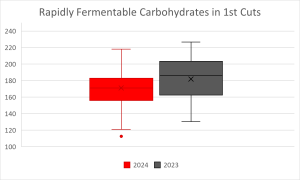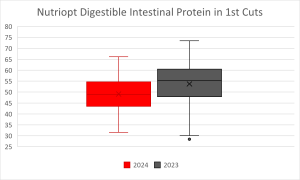Analysing 2024 first cut silages
by Joanna Oldham

Our monthly silage analysis summary provides insights into the current year’s average silage quality and how adjustments may need to be made to maintain animal performance when feeding 2024 first cuts.
Ensuring that rumen microbes have the right balance of fermentable nutrients will be critical to getting the most out of feed this year.
Lower quality first cuts
With the milder weather early in the year, grass continued growing through the winter, increasing the stemmy fibrous proportion of the grass and lowering the nutritional quality, decreasing the average 2024 first cut quality in comparison to 2023 first cuts.
Reduced energy from fermentable carbohydrates
An increase in rainfall throughout the growing period has led to a reduction in rapidly fermentable carbohydrates in silage crops, which decreases the level of available energy in the crop when fed. This could result in less efficient energy utilisation, impacting milk production or growth.

Lower Protein
Crude protein is also lower on average in this year’s first cuts, as reflected in lower NDIP (Nutriopt digestible intestinal protein) values which is a measure of the total supply of metabolisable protein that is available to the animals.

NutriONics solutions
Despite the lower quality silages we are seeing this year, using our rationing software, NutriONics, we can balance both rapidly and slowly fermentable carbohydrates and proteins to help optimise energy and protein within the rumen. This allows rumen microbes to work more efficiently, maximising microbial protein production and improving overall feed utilisation.
Some farms may need to consider adjusting their rations to compensate for the reduced anergy and protein in this years silage in order to maximise efficient performance.
Our range of dairy compounds have been formulated using NutriONics to provide compounds to drive yield and balance a variety of forages and forage qualities on farm.
